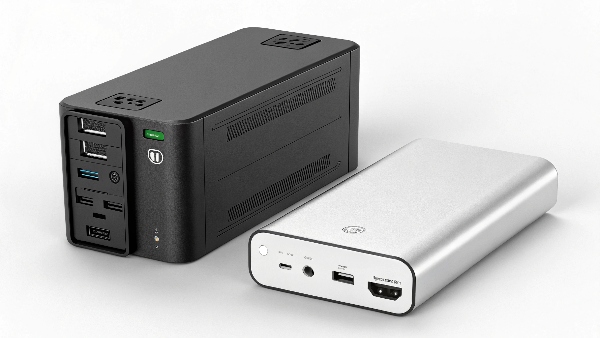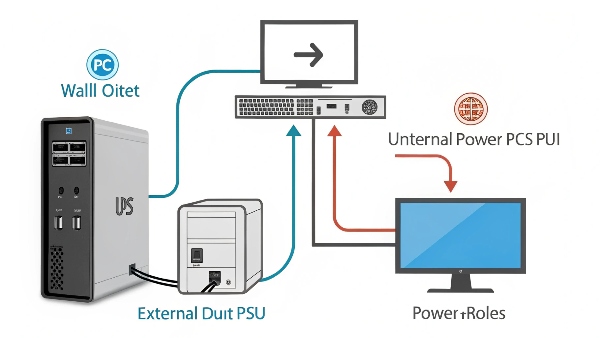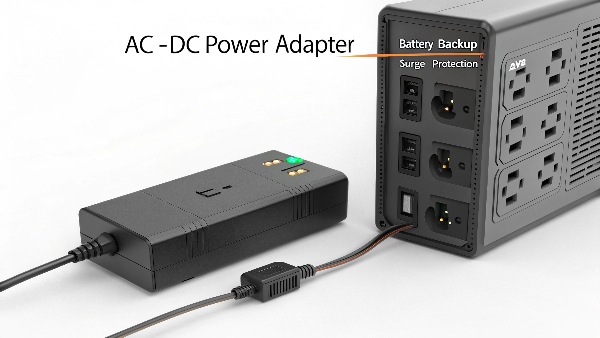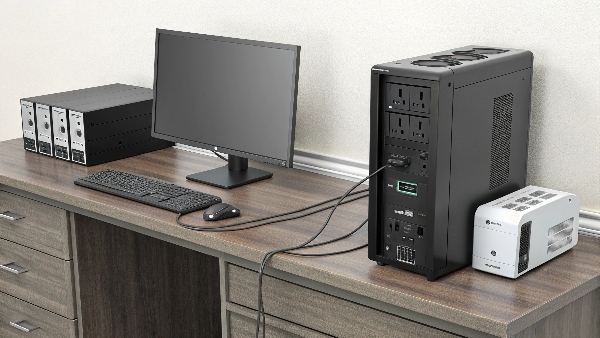Confused about power banks versus UPS? Both offer backup power, but their uses and protections differ significantly, potentially leaving critical gear vulnerable if you choose wrong.
A power bank is a portable battery primarily designed to charge mobile devices like phones and tablets. An uninterruptible power supply (UPS) provides continuous power and robust protection for critical equipment like PCs, servers, and medical devices.

People often ask me if a power bank can do the job of a UPS, or vice-versa. While both devices store electrical energy, their intended purpose, capacity, and the level of protection they offer are vastly different. As an OEM/ODM manufacturer of UPS systems for the past 10 years at DAOPULSE, I've had countless conversations clarifying this. My insight is that the role of a UPS is far greater than that of a power bank. A UPS isn't just about providing power; it's about providing clean, conditioned, and truly uninterruptible power. It incorporates features like high-voltage protection, short-circuit protection, and sophisticated automatic charge and discharge management, which are far beyond the scope of a simple portable charger. These features are critical for our clients, like procurement managers in hospitals or system integrators for data centers, who cannot afford data loss or equipment damage due to power issues.
What is the UPS in a PSU?
Hear "UPS" and "PSU" used in computer discussions? Thinking they might be related or even the same thing can lead to serious under-protection for your valuable computer components.
"UPS" (Uninterruptible Power Supply) is a separate, external device providing backup power. A "PSU" (Power Supply Unit) is an internal computer component that converts AC wall power to DC power for the computer's parts. A PSU itself is not a UPS.

This is a common point of confusion. Let's break it down. The Power Supply Unit (PSU) is a crucial component inside your computer case. Its job is to take the alternating current (AC) from your wall outlet and convert it into various direct current (DC) voltages that your motherboard, CPU, graphics card, and other internal components need to operate. It doesn't store energy or provide backup power on its own.
An Uninterruptible Power Supply (UPS), on the other hand, is an external device that sits between the wall outlet and your computer (including its PSU). The UPS contains batteries and circuitry to do several things:
- Provide immediate backup power if the mains electricity fails.
- Condition the incoming power, protecting against surges, sags, and electrical noise.
So, the UPS feeds clean, protected power to the PSU. The PSU then does its job of converting that AC to DC for the internal components. They work together, but they are distinct units with different primary functions. At DAOPULSE, our UPS systems, whether lead-acid or lithium battery based, are designed to provide optimal input for any high-quality PSU, ensuring the entire system, including the PSU itself, is safeguarded. System integrators rely on this understanding to build truly resilient systems.
| Feature | PSU (Power Supply Unit) | UPS (Uninterruptible Power Supply) |
|---|---|---|
| Location | Internal to a device (e.g., PC) | External device |
| Primary Function | Convert AC to DC for internal components | Provide backup power & power protection for devices |
| Battery Backup | No | Yes |
| Power Input | AC from wall outlet (or UPS) | AC from wall outlet |
| Power Output | DC voltages for internal device components | AC (like wall outlet) for connected external devices |
| Protection Focus | Basic internal overload/short-circuit | External power events (outages, surges, sags, noise) |
Can UPS be used for power supply?
Need to power a device when there's no wall outlet nearby, or during an outage? You might wonder if a UPS can simply act as a general-purpose power source.
Yes, a UPS functions as a power supply, especially during an outage. Its core purpose is to be an uninterruptible source of AC electrical power for connected devices when the main supply fails.

Absolutely, a UPS can be used as a power supply. That's fundamentally what it does. When the main utility power is available, most UPS types pass that power through to your connected equipment, often conditioning it along the way. But the moment utility power fails or goes outside acceptable limits, the UPS seamlessly switches to its internal battery and uses an inverter to convert the battery's DC power back into AC power, supplying your devices. So, in an outage, it is your power supply.
However, it's important to understand its intended role. A UPS is primarily designed as a temporary power source to bridge short outages or allow for a safe shutdown of equipment. While our larger UPS systems at DAOPULSE, especially those with lithium battery UPS solutions, can provide power for extended periods depending on the load, they are not typically meant to replace a generator for very long off-grid scenarios. For instance, a procurement manager for a construction company setting up a temporary site office might ask if a UPS can power their entire setup. I'd explain that for critical IT equipment, yes, but for sustained power over many hours or days for heavy loads, a generator would be more appropriate, with the UPS still playing a role in providing clean, instant power to sensitive electronics before the generator kicks in. The UPS supplies power, but it also protects with features like high-voltage protection and short-circuit protection, which a basic generator might not offer to the same degree for sensitive loads.
What is the difference between a UPS and a power supply?
The terms "UPS" and "power supply" often get muddled. This isn't just semantics; misunderstanding the distinction can lead to inadequate protection for very expensive and critical equipment.
A "power supply" is a general term for any device converting electricity from one form to another (e.g., AC to DC). A UPS is a complete system that includes power supply components but specifically adds battery backup and power conditioning features.

The term "power supply" is quite broad. Your laptop charger is a power supply. The internal PSU in your desktop PC is a power supply. A laboratory benchtop unit that provides variable DC voltage is a power supply. Their basic job is to take an input voltage/current and convert it to a different output voltage/current suitable for a specific device.
An Uninterruptible Power Supply (UPS), however, is a much more specialized and comprehensive system. While a UPS contains power supply components (like a rectifier/charger to convert AC to DC for its batteries, and an inverter to convert DC back to AC for your equipment), its overall function is much more than simple power conversion. The key differences lie in:
- Battery Backup1: A UPS has internal batteries to provide power when the mains fail. Most generic power supplies do not.
- Automatic Switching2: A UPS automatically and instantly switches to battery power.
- Power Conditioning3: Many UPS types (especially Line-Interactive and Online models) actively clean up the power, protecting against surges, sags, noise, and other disturbances. This is a core benefit. My earlier insight about a UPS offering high-voltage protection, short-circuit protection, and automatic charge/discharge management highlights these advanced system-level functions that go far beyond a simple power supply.
At DAOPULSE, our patented technology development is often focused on enhancing these protective and conditioning aspects of the UPS system, ensuring it's not just supplying power, but quality, reliable power. A system integrator for a financial institution needing to protect trading terminals would never rely on just any "power supply"; they need the robust, integrated protection of a UPS.
| Feature | Generic Power Supply (e.g., AC Adapter, PSU) | UPS System |
|---|---|---|
| Primary Role | Power conversion (e.g., AC-DC, DC-DC) | Power backup, power conditioning, power continuity |
| Battery | No | Yes, internal |
| Auto Backup | No | Yes, automatic transfer to battery |
| Protection | Basic (overload, short-circuit for itself) | Comprehensive (outages, sags, surges, noise, etc.) |
| Output during Mains Fail | None | Continues to provide AC power from battery |
| Complexity | Simpler component | More complex system |
Can I plug my PC into an UPS?
Worried about that dreaded "click" as the power goes out, taking your unsaved work with it? You might be wondering if connecting your precious PC to a UPS is the right move.
Yes, absolutely! Plugging your PC (and its monitor and essential peripherals) into a UPS is not only safe but highly recommended to protect against data loss and hardware damage from power issues.

Yes, you absolutely can and should plug your PC into a UPS! This is one of the primary reasons UPS systems are so popular for homes and offices. When you connect your computer, monitor, and perhaps your modem/router to the battery-backed outlets of a UPS, you gain several crucial advantages.
Firstly, it prevents data loss. If the power flickers or goes out completely, the UPS instantly takes over, giving you time to save your work and shut down your computer gracefully. I remember years ago, before I was in this business, losing a significant chunk of a report due to a sudden outage – a lesson learned the hard way!
Secondly, it protects your hardware. Power surges, sags (brownouts), and electrical noise from the utility line can stress and even damage sensitive electronic components inside your PC over time. A good UPS, especially a Line-Interactive or Online model, will filter and condition this power, providing a clean and stable supply to your computer's PSU. This can extend the life of your equipment.
At DAOPULSE, our comprehensive testing and certification processes (CE, RoHS, ISO) ensure that even our entry-level UPS units provide reliable protection. For clients like Mr. Li, a Procurement Manager at a hospital, ensuring even administrative PCs are on UPS units is important for maintaining operational continuity and preventing data corruption in patient records or billing systems. Our UPS design and customization services allow us to provide exactly the right capacity and type of UPS for any PC setup, from a single home office to a large deployment in a corporate environment.
Conclusion
Power banks serve portable charging needs well. But for safeguarding critical electronics like PCs, a UPS offers far superior, comprehensive power protection, making it an essential investment beyond a simple battery.
-
Understanding Battery Backup is crucial for ensuring continuous power during outages, making it essential for critical systems. ↩
-
Exploring Automatic Switching can help you appreciate how UPS systems maintain power without interruption, vital for sensitive equipment. ↩
-
Learning about Power Conditioning reveals how UPS systems protect your devices from power disturbances, ensuring their longevity and performance. ↩

